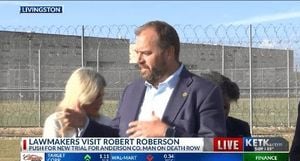Tempers flared in Washington this week as the controversy over Tom Homan, President Trump’s newly reappointed “Border Czar,” took center stage in both Congress and the media. At the heart of the uproar is a $50,000 cash bribe that Homan allegedly accepted in September 2024 from undercover FBI agents posing as businessmen seeking lucrative federal contracts in a possible second Trump administration. The scandal, which first simmered quietly, has now erupted into a full-blown political firestorm, with Democrats in both the Senate and House demanding answers and transparency from the Justice Department and the Trump White House.
On October 7, 2025, U.S. Attorney General Pam Bondi appeared before the Senate Judiciary Committee, where she faced relentless questioning from Senator Sheldon Whitehouse (D-RI). Whitehouse pressed Bondi repeatedly on the fate of the $50,000 that FBI agents reportedly handed to Homan in a brown paper bag during an undercover sting operation. According to Common Dreams, Bondi stuck to a carefully rehearsed script, insisting, “the investigation into Mr. Homan was subjected to a full review by the FBI, agents, and DOJ prosecutors,” and that they “found no credible evidence of any wrongdoing.” But when Whitehouse asked directly what happened to the cash, Bondi dodged the question. “Senator, I’d look at your facts,” she retorted, before suggesting he “speak to the FBI”—an agency she herself oversees. After several rounds of similar exchanges, a visibly frustrated Whitehouse concluded, “I can see that I’m not going to get a straight answer from you to a very simple question.”
The Senate hearing was just the latest flashpoint in an escalating dispute over the Justice Department’s handling of the Homan case. As Axios and New York Times have reported, House Judiciary Committee Democrats, led by Rep. Jamie Raskin (D-Md.) and Rep. Eric Swalwell (D-Calif.), have ramped up their investigation into the alleged bribery and subsequent cover-up. On October 8, the lawmakers sent a pointed letter to Associate Attorney General Stanley Woodward, who led the Trump-Vance DOJ Transition Team, demanding to know “who knew about the Homan cash bribery scandal, when did they know it, and why was Mr. Homan appointed ‘Border Czar’ even in the face of such damning evidence of his taking bribes for government contracts?”
According to internal Justice Department documents cited by multiple outlets, the saga began in September 2024, when FBI agents in Texas—while pursuing an unrelated matter—learned that Homan was soliciting payments from private companies. The agents, posing as business executives, arranged to meet Homan and, with hidden cameras and audiotapes rolling, handed him $50,000 in a restaurant takeout bag. In exchange, Homan allegedly agreed to help steer government contracts to their firms if Trump returned to office. The evidence, according to MSNBC and Axios, included both video and audio recordings of the handoff and the agreement.
Despite the ongoing FBI probe, President Trump announced Homan as his choice for Border Czar on November 10, 2024. Under standard FBI vetting protocols, the Bureau is required to notify the Justice Department about ongoing investigations into senior political appointees, and DOJ leadership would then inform the transition team. As House Democrats noted in their letter, “We have every reason to believe the normal process was followed here.” That puts the spotlight squarely on Stanley Woodward and the Trump-Vance Transition Team, who were responsible for vetting candidates—and, according to Democrats, may have known about the probe but moved ahead with Homan’s appointment anyway.
What happened next is the subject of fierce debate and suspicion. Reports from Axios and Common Dreams indicate that the White House wanted the investigation shut down before Trump’s inauguration. Trump’s then-acting Deputy Attorney General Emil Bove signaled his desire to close the case in early 2025, and soon after, the probe was officially shuttered. The timing—so close to Trump’s return to power—has fueled accusations of a cover-up and political interference in the Justice Department’s work.
The White House has scrambled to contain the fallout. Press Secretary Karoline Leavitt initially denied that Homan ever took the $50,000, saying “Mr. Homan never took the $50,000 that you’re referring to.” But as more details emerged, Leavitt shifted her position, characterizing the FBI sting as “agents going undercover to try and entrap one of the President’s top allies and supporters.” Homan himself, in a Fox News interview, declared, “Look, I did nothing criminal, I did nothing illegal . . . And I’m glad the FBI and DOJ said that nothing illegal happened, no criminal activity.” He went further in a NewsNation appearance, dismissing the reports as “bullsh*t.”
The Justice Department, for its part, has declined to comment publicly on the specifics of the case. A spokesperson told Axios they would not discuss ongoing or closed investigations. Meanwhile, White House spokesperson Abigail Jackson called the Democrats’ probe “blatantly political,” arguing, “This blatantly political investigation, which found no evidence of illegal activity, is yet another example of how the Biden Department of Justice was using its resources to target President Trump’s allies rather than investigate real criminals and the millions of illegal aliens who flooded our country.” Jackson also defended Homan as “a career law enforcement officer and lifelong public servant who is doing a phenomenal job on behalf of President Trump and the country,” and insisted that he “has not been involved with any contract award decisions.”
But Democrats remain unconvinced. Their letter to Woodward lists seven pointed questions about the vetting process, the Trump administration’s awareness of the FBI probe, and whether other appointees were also under investigation at the time of their hiring. They have also requested all records related to the Homan investigation, including the FBI’s full investigative file and any recordings of Homan receiving cash from undercover agents. Though Democrats lack the power to subpoena these documents as the minority party, they are pursuing voluntary interviews with former Biden administration officials who were briefed on the case.
The Homan affair has also revived scrutiny of his broader ties to private companies seeking government contracts. As Common Dreams and Axios have reported, Homan previously received payments from firms wanting border-related work and was a paid consultant for the Geo Group, which later became a key contractor in Trump’s mass deportation efforts. Critics argue that Homan’s influence—and the willingness of companies to pay for access—raises serious ethical questions, regardless of whether criminal charges are ever filed.
For now, the fate of the $50,000 remains a mystery. Attorney General Bondi’s refusal to answer whether the money was ever returned to the FBI has only deepened suspicions among lawmakers and the public. As the investigation grinds on, questions about political interference, transparency, and the integrity of the Justice Department are sure to linger over the Trump administration’s second term—and over Tom Homan’s controversial role as Border Czar.





